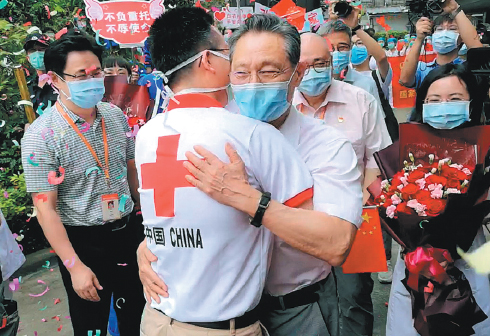Front-line years sharpen top physician's COVID-19 fight

Prominent respiratory disease expert Zhong Nanshan (center) hugs his student Xu Yonghao, an expert in critical care, in Guangzhou, Guangdong province, in May last year. Xu had just returned from Iraq where he helped fight the COVID-19 pandemic. FU CHAOJUN/FOR CHINA DAILY
For Zhong Nanshan, fighting the COVID-19 pandemic remains his top priority, despite the great achievements China has made in preventing and controlling the spread of the virus.
The prominent respiratory disease expert urged Chinese residents to be vaccinated in the coming months, to help prevent the virus from rebounding.
The 85-year-old received his own dose of a domestically developed vaccine in Guangzhou, capital of Guangdong province, in May, and says that all approved vaccines are effective at protecting people from COVID-19, particularly in reducing deaths and the number of severe cases requiring hospitalization.
"It will take two to three years to achieve worldwide herd immunity through vaccinations," the director of the National Clinical Research Center of Respiratory Disease said. "For now, no country is safe until all countries are safe."
Zhong made his remarks in a keynote speech at the 20th Science of Asia Conference, held in the southern metropolis in mid-May.
An academician at the Chinese Academy of Engineering, Zhong has been busy fighting on the COVID-19 front line since the pandemic began about a year and a half ago.
In January 2020, he announced that coronavirus could be transmitted from person to person after he visited Wuhan, capital of Central China's Hubei province, and also urged residents to avoid visiting the city, the hardest hit by the virus at the time.
In addition to treating patients, Zhong devised treatment strategies, and offered valuable suggestions that helped the country fight the pandemic.
He also frequently participated in conferences, forums and video links, to exchange views and compare treatment plans with Chinese and overseas counterparts, and called for greater international cooperation, describing the coronavirus as the common enemy of humankind.
For his outstanding performance in the fight against the pandemic, the doctor, who is a member of the Communist Party of China and also head of a high-level group of experts at China's National Health Commission, was awarded the Medal of the Republic, the country's highest honor, by President Xi Jinping in Beijing in September.
Despite the recognition, Zhong kept working, and immediately asked for a better platform to continue his research on the virus and its effects.
He says he wants to continue to work on the development of treatments and vaccines, as well as collaborate with parallel sectors, to help fight COVID-19 and other pandemics in the future.
"Medical treatment alone is not enough to prevent a pandemic," he said, adding that what's needed is the ability to predict, evaluate, identify and trace the transmission of a disease, tasks that extend far beyond just treatment.
"It requires the participation of many disciplines," he said.
Eighteen years ago, Zhong touched the hearts of medical staff and residents nationwide when he asked to be sent to treat the most seriously ill patients during a different coronavirus pandemic, severe acute respiratory syndrome, or SARS. His hospital was the first to admit and treat patients diagnosed with the disease.
Zhong led the fight against SARS in 2003, and his spirit inspired thousands of medical workers.
Sang Ling, a doctor at the First Affiliated Hospital of Guangzhou Medical University and one of Zhong's students, said that his teacher always advised students and colleagues to get their own jobs done first.
"We live in a good time, there is no reason not to work hard," Sang recalled Zhong telling him from Wuhan by phone on the first day of the Lunar New Year in 2020.
Despite being too busy to stop himself, Sang said Zhong nevertheless advised him to rest well, and make sure he stayed alive.
Xu Yonghao, an expert in critical care, said that Zhong exemplified the responsible attitude of Party members and medical staff, and the preciseness and carefulness of their work, adding that ceaseless effort is the obsession of every doctor.
"He taught us that a doctor should go wherever he or she is needed," Xu said.
Encouraged and inspired by Zhong's example, many of the doctors at his hospital, who graduated from the 1980s onward, have been working on the front lines of the campaign against COVID-19 since the start of last year.
A star athlete, who broke the national record for the 400-meter hurdle when he was a student, it was through sport that Zhong met his wife, Li Shaofen, the then deputy captain of the Chinese women's basketball team.
The couple married in the 1960s after dating for eight years.
Born into a medical family, Zhong has a son and a daughter. His father, Zhong Shifan, a well-known pediatrician, was once president of the Guangdong Provincial People's Hospital, and his son, Zhong Weide, is now a senior urologist.



 Print
Print Mail
Mail

